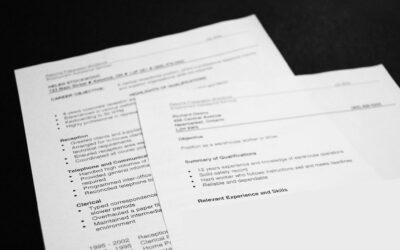Job search is often more difficult than people imagine. It takes longer than you originally thought – it’s not quite as exciting as it was in the beginning – and before long, the process takes a toll on your psyche.
This emotional wear and tear can, in turn, slow your job search even more, creating an ongoing cycle of negativity.
If you’re headed into a job search – or are already in the middle of one – it’s wise to consider the emotional aspects and create a proactive plan for how you’ll manage them. Here are a few common causes of emotion along with strategies for handling them effectively.
Dealing With Silence
These days, for every job posting advertised, a prospective employer can expect to receive hundreds of applications. Recruiters and human resources professionals are overwhelmed with resumes and inquiries, and most haven’t truly learned how to leverage technology effectively. As a result, those involved in hiring tend to be woefully poor communicators.
It’s not uncommon to submit a resume to an online application system and hear absolutely nothing back – not even a confirmation that your info was received. Even if you get past this stage and actually speak to a person, you may end up ghosted at any point with no explanation as to why.
Yes, these practices are rude and disrespectful to job candidates, but they are also extremely common. Don’t take it personally. Recognize that silence is expected. In most cases, you will only hear from prospective employers when you’re in the running for a role. If they’re not interested, they most likely won’t bother communicating that. Don’t hold your breath waiting for more information.
Tip: Keep your forward momentum and continue your job search. Don’t wait for an answer, always be filling your pipeline with opportunities.
Handling Rejection
If and when you do receive a rejection, recognize that this too is part of the process. Only one person can get the job and it may not be you.
Don’t allow rejection to create self-doubt. Honestly evaluate your candidacy and what you might have done better. Find any lessons you can and use them to improve your chances in the future. But don’t treat this as a referendum on your abilities as a professional or who you are as a person.
Trust that their decision was the right one. For whatever reason, this organization felt you weren’t right for the role. This rejection saves you a lot of headaches; it’s much better than ending up in a role that’s not a good fit. Try to see it as a blessing in disguise.
Tip: If you keep your pipeline full, one rejection doesn’t hurt that much. You still have other opportunities in various stages of the process. Focus on those that you still have active.
Not Understanding Why
For many, the mysteries involved with job search are incredibly difficult to handle. It’s rare that you ever really know why some decisions are made. Few organizations provide feedback to rejected candidates for fear of accidentally stepping into murky legal waters. Once again, silence is the most common form of feedback, which leaves much to the imagination.
Many job seekers try to make sense of the situation by fabricating scenarios to explain why they didn’t get the job or why they didn’t even get invited to an interview. Unfortunately, such exercises are totally futile.
You might look at a job posting and think you’re perfect for the role, but you have no idea what other factors are in play – and you probably never will. Maybe they had an internal employee already in mind for the job. Or maybe the budget got cut and the job was eliminated. Or maybe they saw a gaping hole in your skill set or just didn’t like the font you used on your resume. Maybe they hired a bad employee from your alma mater in the past, so you were immediately blacklisted.
If you try to guess what happened, you’ll drive yourself crazy!
Tip: The only course of action is to continue on. Don’t waste time with speculation. In most cases, it’s out of your hands anyway. You couldn’t have done anything to get a different result.
Job search can be an emotional roller coaster, but it doesn’t have to be. The best approach is simple: Keep your expectations in check. Always assume you didn’t get the job and keep your search moving forward. Don’t get ahead of yourself and wait to celebrate until after you’ve signed on the dotted line.

Rick Christensen: Director, Career Transition Practice Rick has been a career consultant for over 25 years, serving a very broad-based and diverse clientele. His specialties include effective group facilitation, one-on-one coaching and consultation at all levels including senior executives.
Rick’s passion is coaching individuals through career transitions, developing career management strategies and in identifying and sharpening competencies to open doors to new opportunities. His efforts have assisted thousands of individuals achieve their full potential.
Contact Rick at: Rick@CareerDevelopmentPartners.com



